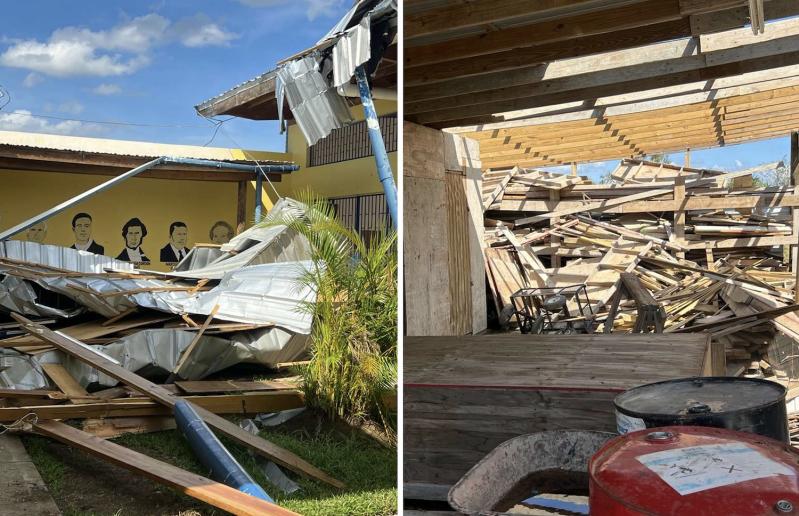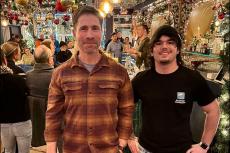“It’s like the end of the world,” Danielle A., a native of Kingston, Jamaica, said of pictures of the devastation caused by Hurricane Melissa, which hit her home country on Oct. 28. “It’s apocalyptic.”
Danielle, who works at Hampton Chutney Co. in East Hampton Village and asked that her last name not be used, was emotional on Tuesday as she relayed reports from Montego Bay in hard-hit western Jamaica, where her family lives. “My family, for the most part, is safe, but I know people,” she said, her voice trailing off. “It’s like nothing they’ve ever seen before. It’s devastating.”
East Hampton Town’s Jamaican population has been focused on the news and social media since Melissa struck as a Category 5 storm last week, making landfall with winds up to 185 miles per hour. It was the strongest storm ever to hit the country. As of Tuesday, 32 people were confirmed dead, but aid workers had yet to reach many rural areas.
“I can’t find words to describe it,” said Meloney Brydson of East Hampton, who works at the Palm at the Huntting Inn in the village. Ms. Brydson is from Westmoreland Parish, on the devastated western end of the island. “My entire family is there — five siblings, Mom and Dad.”
Her father, who lives in Montauk, had recently traveled to Jamaica to spend a few weeks with his family, Ms. Brydson said. “Houses are completely gone, washed away or destroyed by wind or water. People have lost everything, everything you can think of — furniture, clothes. It’s like starting over: After working to accomplish so much, it disappeared in a couple of seconds.”
Roads are blocked by downed trees or utility poles, and people have no access to water, electricity, food, or fuel, Ms. Brydson said. Gas stations are closed, and A.T.M.s have been destroyed. “I talked with my dad this morning,” she said on Tuesday. “He has no cash, no access to an A.T.M., no gas in the car. Every time you talk to someone, it gets worse.”
In Portland Parish, on the east end of the island, “many of the families have lost their homes,” said Dearmo Ramsay, who is working as a home health aide in Amagansett. Electricity was restored on Monday, her sister reported that day, but “there was no running water. Many of the buildings were destroyed,” and “a lot of people don’t have food, because supermarkets were badly damaged.”
“A lot of attention is not being given to Portland,” Rhyan Bailey, who is in the parish, told The Star via WhatsApp, “because it would appear as if real impacts are to the western end of the island. Much of the resources are not being channeled to this part of the parish. Families have been severely impacted. In one community, over 30 houses have been damaged, and in another over 20 have been impacted by strong winds and flooding.”
Rural areas remain without internet, electricity, or water, Mr. Bailey said, and at the College of Agriculture, Science, and Education in Portland’s Port Antonio, students are without basic necessities yet unable to return to their communities due to the devastation there. “They need basic things to survive on campus,” he said.
In Negril, on Jamaica’s west coast, “we were outside the eye,” Vanessa Moore of the Rockhouse Foundation, which works to build, upgrade, and modernize schools and libraries, said on Monday. “We have fallen trees, downed power lines, no water, very limited cell service, roofs off — but nothing in comparison to the places I have been in the last 48 hours.” Other areas “look like a bomb went off — total destruction of homes, roofs down, everything is down. It’s absolutely unreal. I’ve never seen anything like it.”
Paul Salmon, founder of the Rockhouse Foundation and the Rockhouse Hotel, was awaiting delivery of generator parts in New York on Monday before traveling to Jamaica. “We’re still trying to find everyone in our community, workers from the hotel, largely in more isolated communities that are still cut off by fallen trees in roads,” said Mr. Salmon, whose family owns a house in Bridgehampton. “There’s probably a handful left who we’re trying to locate, isolated in their communities.” Losses experienced by Rockhouse employees range from structural damage to total destruction of their residences, he said. “Cell service is slowly restoring there, with one big provider back up and working, helping us connect today with many of our team that we had not been able to previously.”
Those who came to the South Fork from Jamaica, and those who have made Jamaica their adopted home, urge the public to donate what they can to relief efforts. And there are many. The Rockhouse Foundation Hurricane Melissa Relief Fund, a GoFundMe campaign, had raised more than $284,000 as of Tuesday evening.
Ms. Brydson has also launched a GoFundMe campaign, “Donate to Restore Lives in Jamaica Post-Hurricane.” As of Tuesday evening, she had raised more than $8,600. “I’m currently in the process of packing barrels of nonperishable items, emergency supplies, and clothing for people I know who have lost their homes,” she said. “We’re in a crisis. We just want people to have food and clean water so they can survive. Tents, bedding and sheets, baby food, diapers for infants and elderly people” are needed.
Ms. Ramsay has a nonprofit organization called VitalizingIMPACT. She can be contacted via the vitalizing_impact handle on Instagram.
The Montauk Chamber of Commerce is collecting canned goods and dry foods to aid in relief efforts. Donors have been asked to take items to the Montauk Visitor Center Monday through tomorrow from 9 a.m. to 5 p.m. The chamber is also leading a fund-raising campaign, “Help Montauk Send Aid to Jamaican Workers,” on GoFundMe. More than $11,200 had been raised as of Tuesday night.
The Jamaican government has approved a 30-day tax waiver on a long list of specific goods being imported by the public for the recovery effort. Import duties and general consumption taxes are waived on items including diapers, clothing, cleaning products, toiletries, tents, sleeping bags, bottled water, solar flood lights, and basic hand tools.
“They need everything,” Ms. Moore said. “Clothes, necessities, feminine hygiene kits, electrical things — in some cases, an actual house. Infrastructure is going to take time to build back.”
“We are a strong people,” Danielle said at Hampton Chutney Co. “We are resilient. The only hope we have is that we can do hard things, and we’re going to build back even better. A lot of people are helping — our neighbors, the U.S., the U.N., everyone is chipping in where they can, and that’s the best hope.”




